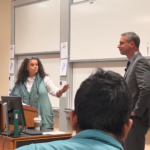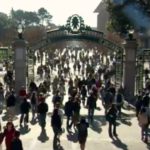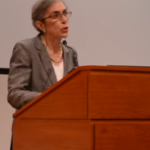Give thanks for energy
During a recent trip, a flight attendant asked me where I was going. She smiled and asked, “Vacation?” “No,” I said, “I’m giving a speech.” She wondered about my topic. “Energy,” I replied. “Great, I used to be a nutritionist,” She responded. I told her that it wasn’t that kind of energy.
As we head into Thanksgiving, you may think you need lots of her type of energy—and you’d be right. But without my kind of energy, you’d need a whole lot more of her kind of energy to create the “old fashioned” Thanksgiving that so many of us picture when we think of the nationwide holiday.
One of the big traditions of Thanksgiving is the entire multi-generational family gathered around the table. Back in the day of the picture perfect holiday, travel meant hitching up the horse and wagon. Today, to accomplish this, family members often have to travel great distances to get to the site of the big meal. Thanksgiving is reported as the busiest travel season—whether by auto or air. But even before the travel takes place, energy is a big part of the picture.
The travel has to be planned. Air travel takes a visit to one’s favorite travel website. Travel by land often requires a Mapquest search for the best route. Both need energy to function. Then when the actual travel takes place, regardless of the method or distance, fuel is needed to make the trip possible.
Even the big meal takes more energy than one might assume. First the turkey has to be raised (I’ll not belabor each phase of energy used there). Then to get it to the store in a safe and sanitary manner, requires refrigeration and transportation—both are energy dependent. Once at the store refrigeration is, again, important. To go to the store to make your selection demands fuel.
Let’s jump to the big day. Most people stuff the bird and cook it in the oven—though the fried turkey has increased in popularity. Either way, energy is required for cooking—natural gas, electricity or propane. And, that does not include the veggies, the mashed potatoes (that need a mixer), or the freshly baked rolls. The Thanksgiving feast typically includes some sort of salad. At my great aunt’s home in Massachusetts, salad was green Jello with chopped celery and a dollop of mayonnaise. In modern homes the salad is usually lettuce based. Again energy is needed to keep things fresh and cool.
Once the meal is ready, many people use an electric knife to cut the turkey and a hot plate to keep things warm while the final preparations are made. Both need energy.
Around the table, the ambiance may be created the “old fashioned” way with candles and a flickering wood-fueled fire. But even fire is energy—the first used in civilization. But maybe you have music playing on the stereo—tunes downloaded from iTunes (thanks to energy).
Post meal, fat and happy, many households will retire to the sofa to watch the big game of the day. Once again energy is a central feature. It gets all the on-site participants to the stadium—lit by energy. Energy powers the television cameras. Perhaps the image gets to your home via satellite or cable. Neither is possible without energy. Once in your home, that flat screen TV needs electricity and rare earth to give you that great picture. Whatever you are drinking is hot or cold thanks to energy.
But it is not over yet. In most homes, while the men watch the game, the women clean up. Whew! The dishwasher makes it so much easier. And the hot water coming straight from the tap is expected. Once again, energy.
If you are the cook, by the end of the day, you are ready for all of those people to head home. You are lacking energy and are ready to crawl under your electric blanket—all warm and snuggly.
Once you start thinking about it, you can see myriad other ways that energy makes your Thanksgiving the picture-perfect event of which you’ve dreamed. Maybe your digital camera was used, your computer to view the shots, your printer to print out copies for everyone. You get the picture.
When you come to the table and bow your head to give thanks for the family, friends and food—don’t forget the energy that made it all possible.
Marita Noon is the executive director of the Citizens Alliance for Responsible Energy (CARE), a nonprofit, membership-based organization working to educate the public and influence policy makers regarding energy, its role in freedom and the American way of life. She can be reached at marita@responsiblenergy.org or www.responsiblenergy.org.




